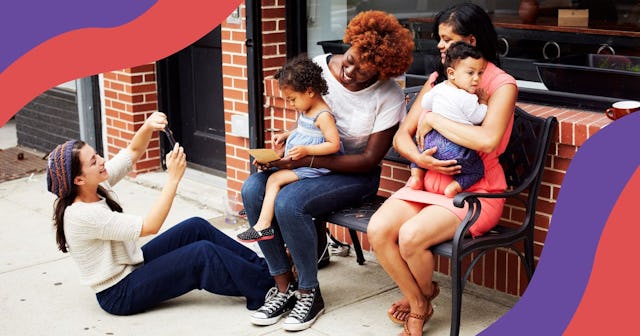To My Mom Friends: Tell Me How It Really Is

Give me the truth, the authenticity. I don’t care if the blood of it stains me. Tell me how it really is.
I want to hear it. I want to hear that you cry fresh tears after your three-year-old child throws a block at your head, leaving behind a small bruise that you hide with ancient gobs of makeup. You try not to take it personally, but you do. I want to hear it was beyond difficult setting up a birthday party for your one-year-old amidst the pressures of this Instagram-perfect society in which the sun shines brightly, the guests laugh lightly, and your child eats the layered smash cake in ideal stickiness stuck to perfectly pudgy fingers. I want to hear that the hour-long tantrums send you to eat the stale Halloween candy from eight months ago that still hides inside your cupboards. I want to hear that you struggle with America’s view of a mother’s worth: only six weeks of paid maternity leave. I want to hear that the despair you feel signals something beyond the baby blues, that these feelings of utter sadness have reared again inside your heart now that the same child is a teenager.
It doesn’t have to be all sorrow. Tell me your joys, too. I just ask for the real ones, please. The time you cried when your son’s first tooth came out so tiny and white and you cradled it in the palm of your hand. The moment you first held your child after hours and hours of labor and how you wondered if you were honestly going to make it. The secret hugs you get from a growing tween, bony shoulders through thinning shirts. The moment your daughter leaves for college and doesn’t look back. Life isn’t all black and white. Give me your grays. The confusing moments, the times when you’re uncertain, the points of your life when you feel every single emotion all at once.
At one time in our history, long before the father, mothers united humanity. They were connected to the earth through natural cycles that brought both birth and death. They were celebrated and held important roles in society, even in older age. They created, they healed, they imparted wisdom, they cemented the community together. They rose, rooted like trees from the earth.
There are many names for these mother goddesses. But we have forgotten their names, just as we have forgotten our own desolate selves. We lay trash on our shores, we expect the impossible, we continue to industrialize, we are lost. We have forgotten to honor the mother.
We have forgotten their stories.
Now, we oftentimes hide the fact that we are mothers. It doesn’t matter if we stay at home or if we work. Motherhood interferes. We are weak if we need help from a village. We are looked at differently if we take a day off work to care for a sick child. We toil ourselves to the bone in order to fulfill a tacit agreement that American society wrote for us and that says we must do everything perfectly. We do most of this alone. It just adds to the maternal mental health crisis that mothers face. Eight check-up appointments for our newborn and countless others while pregnant and only one postpartum check-up for the mother. With this, we assume our worth.
In reality, our worth transcends beyond what is expected of us. We do it all, this screaming list of unspoken duties that continues to add titles behind our name, titles that reach beyond just “mother.” We become housekeepers, chefs, professional organizers, chauffeurs, gardeners, wardrobe shoppers, seamstresses, and so much more. Yet we tell everyone we are okay.
To say we are burned out is an understatement.
It isn’t the floppy hats, the perfectly layered lipstick, the false eyelashes pressed tightly to thinning lids that shows strength. It isn’t the put-together look. Show me the nakedness, the rawness, the C-section scars, the mascara that runs down your cheeks, the bags under your eyes. Realness is the strength I seek. Vulnerability. Unleashing what’s on your heart, pink layer by pink layer, until all that’s left is the core.
Tell me how utterly complicated it really is to be a mother. I want to be connected. So that when my own postpartum depression comes, when the loneliness settles in my veins, when the four walls of a house close in, I’ll know that it isn’t just me. I’ll know that I’m not alone.
Tell me your true stories. Because it’s the stories that make you human.
It’s the stories that make us mothers.
This article was originally published on